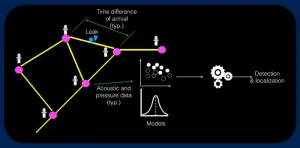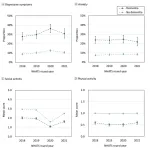(Press-News.org) LOS ANGELES — Two people regularly have a few alcoholic drinks daily. One develops liver disease. The other doesn’t.
What explains the different outcomes?
The answer may lie in a condition known as metabolic syndrome, a cluster of conditions that together raise the risk of coronary heart disease, diabetes, stroke and other serious health problems. This syndrome, characterized by symptoms such as abdominal fat, high blood pressure, high cholesterol and high blood sugar, affects more than one in three Americans.
A new study from Keck Medicine of USC published in the Annals of Internal Medicine shows that heavy alcohol use may be dramatically more damaging to the liver for people with metabolic syndrome.
“Our research suggests that metabolic syndrome and alcohol interact in such a way that they multiply the effect of alcohol on the liver, more than doubling the risk of advanced liver disease among heavy drinkers,” said Brian P. Lee, MD, MAS, a hepatologist and liver transplant specialist with Keck Medicine who is the lead author on the study. “Drinking is harmful to the liver, but especially so for this segment of the population.”
In the study, heavy alcohol use was defined as two drinks (a total of 12 fluid ounces) a day for women and three drinks (a total of 18 fluid ounces) per day for men.
Lee and his colleagues were motivated to research a connection between advanced liver disease, alcohol use and metabolic syndrome after noticing that between 2009-2018, deaths from alcohol-associated liver disease surged in the United States by more than 30% while alcohol use, including heavy drinking, remained stable or declined.
During the last 20 years, the number of Americans with metabolic syndrome increased significantly. Previous research has shown that metabolic syndrome can cause liver abnormalities.
“We therefore hypothesized that metabolic syndrome could be an important contributor to this unexplained surge in advanced liver disease,” said Lee.
For the study, Lee and his fellow researchers used data from the National Health and Nutrition Examination Survey, which assesses the health and nutritional status of adults and children in the United States, pulling together samples representing the U.S. population 20 years or older between 1999 and 2018.
While the data revealed a slight increase in advanced liver disease with heavy alcohol use without metabolic syndrome, the greatest increase in advanced liver disease was found in those with combined heavy alcohol use and metabolic syndrome.
Lee believes that the increased risk of liver damage from drinking is a result of an increase in the amount of fat in the liver. A healthy liver contains less than five percent fat; any more than that can lead to inflammation and cirrhosis (scarring) of the liver, liver cancer and liver failure.
“Both metabolic syndrome and drinking increase liver fat, and we think that the combination of the two accelerates the accumulation of fat in the liver and fuels inflammation, resulting in a greater chance of liver disease,” said Lee.
He hopes the study will encourage physicians who screen and diagnose patients with metabolic syndrome to also ask about alcohol use and look for liver disease.
“Our study indicates that these conditions may often coexist, and it is in patients’ best interest to address both issues,” he said. “It’s also important for people with metabolic syndrome to realize they may be at an increased likelihood of advanced liver disease, and to monitor their drinking accordingly,” he added.
The other authors of the study are Jennifer Dodge, MPH, assistant professor of research medicine and population and public health sciences with the Keck School of Medicine of USC; Wendy Mack, PhD, professor of population and public health sciences with the Keck School of Medicine; Adam Leventhal, PhD, professor of population and public health sciences with the Keck School of Medicine and director of the USC Institute for Addiction Science and Norah Terrault, MD, MPH, a Keck Medicine gastroenterologist and division chief of gastroenterology and liver diseases with the Keck School of Medicine.
###
For more information about Keck Medicine of USC, please visit news.KeckMedicine.org.
END
Heavy drinking poses even greater risk for one in three Americans
A new study from Keck Medicine of USC shows that metabolic syndrome, a cluster of conditions that raise the risk of heart disease, diabetes, stroke and other health problems, more than doubles the risk of advanced liver disease among heavy drinkers
2023-05-11
ELSE PRESS RELEASES FROM THIS DATE:
Gene linking circadian and circatidal rhythms is discovered in tiny crustacean
2023-05-11
Scientists at UMass Chan Medical School and the Marine Biological Laboratory at Woods Hole have identified the first gene—Bmal1—to play a crucial role in regulating circatidal behavior in the crustacean Parhyale hawaiensis. Circatidal rhythms help animals cope with the rise and fall of the tides in coastal areas.
Published in Current Biology, the study by neurobiologists Patrick Emery, PhD, Joshua Rosenthal, PhD, and colleagues demonstrates the first molecular link between circatidal and circadian ...
Fire hydrant hydrophones find water leaks #ASA184
2023-05-11
CHICAGO, May 11, 2023 – Access to clean drinking water is essential for healthy communities, but delivering that water is growing increasingly difficult for many utilities. Corroding pipes and land shifts in aging water distribution networks can create frequent leaks, wasting water before it ever gets to the tap. Utilities in the U.S. lose about 6 billion gallons of water a day — enough to fill 9,000 swimming pools — due to leaks, in addition to wasted energy and resources spent in collecting and treating that water.
Pranav Agrawal and Sriram Narasimhan from the University ...
InVADER mission to test its robotic laser divebot on a deep-sea expedition
2023-05-11
InVADER Mission to Test its Robotic Laser Divebot on a Deep-Sea Expedition
Team to test technologies for use in future planetary exploration while providing data to survey deep-sea ecosystems and minerals on Earth
May 11, 2023, Mountain View, CA – A team of scientists and engineers from the SETI Institute, Impossible Sensing, NASA JPL, and other institutions will test their innovative robotic laser system on a deep-sea expedition aboard the E/V Nautilus. The mission, called InVADER (In-situ Vent Analysis Divebot for Exobiology Research), aims to advance technologies to explore, ...
Rensselaer researcher uses artificial intelligence to discover new materials for advanced computing
2023-05-11
A team of researchers led by Rensselaer Polytechnic Institute’s Trevor David Rhone, assistant professor in the Department of Physics, Applied Physics, and Astronomy, has identified novel van der Waals (vdW) magnets using cutting-edge tools in artificial intelligence (AI). In particular, the team identified transition metal halide vdW materials with large magnetic moments that are predicted to be chemically stable using semi-supervised learning. These two-dimensional (2D) vdW magnets have potential applications in data storage, spintronics, and even quantum computing.
Rhone ...
Having dementia and reduction in social participation are associated with increased depression and anxiety during the COVID-19 pandemic
2023-05-11
Tokyo, May 8, 2023 -- An increased risk of depression and anxiety among US older adults with dementia and poor activity participation has been demonstrated through an analysis of data from the National Health and Aging Trends Study (NHATS), a nationally representative population-based study.
These findings were reached by a team of researchers from the Tohoku University Graduate School of Medicine, Exploratory Oncology Research and Clinical Trial Center in National Cancer Center, and Tokyo Metropolitan Institute of Medical Science, Japan. This study is published in the Journal of Alzheimer’s Disease Reports 7(1).
The coronavirus disease 2019 (COVID-19) ...
Targeting uncontrolled inflammation may hold the key to treating therapy-resistant cancers
2023-05-11
GRAND RAPIDS, Mich. (May 11, 2023) — Van Andel Institute scientists have pinpointed how a specific gene mutation triggers an inflammatory cascade that may drive development of treatment-resistant cancers.
The new findings, published today in Molecular Cell, reveal for the first time the molecular circuitry by which mutations in the gene STK11 cause inflammation to spiral out of control. The resulting chemical firestorm damages healthy cells and can enable cancer development. Tumors that lose the STK11 gene are tough ...
With new experimental method, researchers probe spin structure in 2D materials for first time
2023-05-11
PROVIDENCE, R.I. [Brown University] — For two decades, physicists have tried to directly manipulate the spin of electrons in 2D materials like graphene. Doing so could spark key advances in the burgeoning world of 2D electronics, a field where super-fast, small and flexible electronic devices carry out computations based on quantum mechanics.
Standing in the way is that the typical way in which scientists measure the spin of electrons — an essential behavior that gives everything in the physical universe its structure — usually doesn’t work in 2D materials. This makes it incredibly difficult to fully understand the materials and propel forward technological ...
These sounds are out of this world! #ASA184
2023-05-11
CHICAGO, May 11, 2023 – You may know how other planets look, like the rust orange, dusty surface of Mars or the vibrant teal of Uranus. But what do those planets sound like?
Timothy G. Leighton from the University of Southampton in the U.K. designed a software program that produces extraterrestrial environmental sounds and predicts how human voices might change in distant worlds. He will demonstrate his work at the upcoming 184th Meeting of the Acoustical Society of America, running May 8-12 at the Chicago Marriott Downtown Magnificent Mile Hotel. His presentation will take place ...
New composite strategy leaves coverage questions behind, researchers report
2023-05-11
Answers could be cloudy for researchers using Landsat images to investigate the coverage of the continental United States. The National Land Cover Database (NLCD) are useful products for scientists to understand how things like tree canopy and road coverage changes over time, but something as simple as cloud coverage can be misinterpreted in the satellite images as a significant surface coverage change. How can researchers be sure they’re getting a truly representative understanding of any one area?
The answer lies in composite ...
Comparison of depression and anxiety following self-reported COVID-19–like symptoms vs SARS-CoV-2 seropositivity
2023-05-11
About The Study: In this study of more than 45,000 individuals drawn from the French general population, COVID-19–like symptoms, but not SARS-CoV-2 infection, during the first months of the pandemic were associated with an increased occurrence of subsequent depression and anxiety eight months or more after the occurrence of COVID-19–like symptoms, even when SARS-CoV-2 serologic test results were negative.
Authors: Alexandra Rouquette, M.D., Ph.D., of the Université de Versailles Saint-Quentin-en-Yvelines in Paris, is the corresponding ...
LAST 30 PRESS RELEASES:
Cannabis compounds show promise in fighting fatty liver disease
Study in mice reveals the brain circuits behind why we help others
Online forum to explore how organic carbon amendments can improve soil health while storing carbon
Turning agricultural plastic waste into valuable chemicals with biochar catalysts
Hidden viral networks in soil microplastics may shape the future of sustainable agriculture
Americans don’t just fear driverless cars will crash — they fear mass job losses
Mayo Clinic researchers find combination therapy reduces effects of ‘zombie cells’ in diabetic kidney disease
Preventing breast cancer resistance to CDK4/6 inhibitors using genomic findings
Carbon nanotube fiber ‘textile’ heaters could help industry electrify high-temperature gas heating
Improving your biological age gap is associated with better brain health
Learning makes brain cells work together, not apart
Engineers improve infrared devices using century-old materials
Physicists mathematically create the first ‘ideal glass’
Microbe exposure may not protect against developing allergic disease
Forest damage in Europe to rise by around 20% by 2100 even if warming is limited to 2°C
Rapid population growth helped koala’s recovery from severe genetic bottleneck
CAR-expressing astrocytes target and clear amyloid-β in mouse model of Alzheimer’s disease
Unique Rubisco subunit boosts carbon assimilation in land plants
Climate change will drive increasing forest disturbances across Europe throughout the next century
Enhanced brain cells clear away dementia-related proteins
This odd little plant could help turbocharge crop yields
Flipped chromosomal segments drive natural selection
Whole-genome study of koalas transforms how we understand genetic risk in endangered species
Worcester Polytechnic Institute identifies new tool for predicting Alzheimer’s disease
HSS studies highlight advantages of osseointegration for people with an amputation
Buck Institute launches Healthspan Horizons to turn long-term health data into Actionable healthspan insights
University of Ottawa Heart Institute, the University of Ottawa and McGill University launch ARCHIMEDES to advance health research in Canada
The world’s largest brain research prize awarded for groundbreaking discoveries on how we sense touch and pain
Magnetofluids help to overcome challenges in left atrial appendage occlusion
Brain-clearing cells offer clues to slowing Alzheimer’s disease progression
[Press-News.org] Heavy drinking poses even greater risk for one in three AmericansA new study from Keck Medicine of USC shows that metabolic syndrome, a cluster of conditions that raise the risk of heart disease, diabetes, stroke and other health problems, more than doubles the risk of advanced liver disease among heavy drinkers










